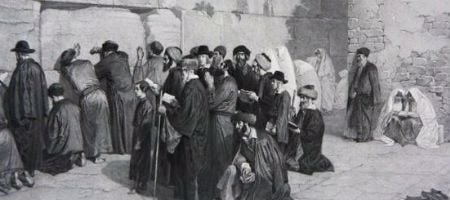On the 10th of Teves, Nevuchadnetzar, king of Babylon, arrived and laid siege to the holy city of Yerushalayim. This marked the onset of the destruction of the first Beis haMikdash, prompting the Sages to designate this date as a fast day for subsequent generations. Asara b’Teves is observed as a more stringent fast day compared to Ta’anis Esther and Tzom Gedalya. The Aruch HaShulchan (559) provides the following historical context:
…And the tenth of Teves, on which the wicked Nevuchadnetzar drew close to Yerushalayim, as is written in Melachim (2:25:1) and Yirmiyahu (52:4) – in the ninth year of Tzidkiyahu’s reign, in the tenth month, on the tenth of the month, Nevuchadnetzar came with all his troops upon Yerushalayim. Hashem revealed this to Yechezkel, who was in Bavel among those exiled with Yechanya, in a prophetic vision on that very day, as it is written in Yechezkel (24:1-2), “And the word of Hashem came to me in the ninth year on the tenth month on the tenth of the month, saying: ‘Ben Adam, write for yourself the name of the day, this very day (“es Etzem Yom haZeh”), for this very day the king of Bavel laid siege to Yerushalayim’.” In other words, he was commanded to write the name of the day, that is, the month, and also the specific day. So he wrote down the tenth day of the tenth month, but the prophet did not know why he was commanded to write this. After he wrote it, Hashem revealed to him: Know that the king of Bavel approached Yerushalayim on this very day. Through this, everyone saw the true prophecy, how in Bavel it was revealed to the prophet at that day and time… [This prophecy was conveyed] since there were false prophets at the time who deceived Israel, such as Chananya ben Azor and his compatriots, who prophesied that the Beis haMikdash would not be destroyed and that Israel would not be exiled from their land, and [thereby] strengthened the hands of transgressors. As for Yirmiyahu who rebuked them to return to Hashem, and [warned that] else the Beis haMikdash would be destroyed and Israel exiled, they incarcerated him in the Chatzer haMatara, and put him in a pit of clay, as detailed in the book of Yirmiyahu. Therefore, Hashem informed Yechezkel the prophet in Bavel that Yirmiyahu was a true prophet, and he prophesied in Bavel everything that happened in Eretz Yisrael. Since the tenth of Teves was the beginning of the troubles, they established it as a fast day for the generations.
The Beis Yosef (540) cites the Avudraham who brings an opinion that if the 10th of Teves falls on Shabbos, one would have to fast, as implied by the emphatic “This very day“. Although this opinion is not accepted as Halacha[1], it underscores the severity of this fast day in relation to the other fast days. Therefore, it is forbidden to break the accepted norms and eat on this fast day unless one has a Halachic exemption.
General guidelines for the fast:
- Fasting begins at Alos haShachar and lasts until Tzes haKochavim (Shulchan Aruch, 550:2, 562:1).
- It is permissible to wash, moisturize, wear shoes, and have marital relations (Shulchan Aruch, 550:2).
- According to Ashkenazi custom, a Ba’al Nefesh (a person with spiritual aspirations) should be stricter than the letter of the law and refrain from washing himself with hot water. However, he may wash his entire body with cold water, and his face, hands, and feet with hot water (Mishna Berura, 6; Sha’ar ha’Tziyun 8-9). He should also refrain from marital relations unless it is Leil Tevila.
- Ashkenazim do not rinse out their mouths, even in the morning. If a person is suffering, he may rinse out his mouth but should take care not to swallow (Shulchan Aruch, 567:3, Mishna Berura, ibid. 10-11). It is permissible to swallow saliva (ibid. 13).
- A Choleh sheEin Bo Sakana is exempt from fasting (Shulchan Aruch, 554:6). He may not push himself to fast (Mishna Berura, 550:4).
- Who is a Choleh sheEin Bo Sakana? Any person who is bedridden and would find it difficult to get up and walk about due to illness. Additionally, a person who is in pain all over his body is considered to be in this category (Shulchan Aruch, 328:10).
- A person who has undergone complicated surgery does not fast for 30 days. After minor surgery, he does not fast for three or seven days, depending on how he feels.
- A person with a high fever (38°C or 100.4°F) should not fast.
- A person suffering from significant weakness or severe headache is exempt from fasting. A doctor should be consulted in these cases (Biur Halacha, 550, 1; Aruch HaShulchan, 550:1).
- There is no reason for a patient who is required to eat to fast for a few hours; he may eat from the start of the day (Avnei Nezer; O.C., 540). However, he should not pamper himself with meat and wine and should eat only what he requires for his health (Mishna Berura, 550:5). He does not recite Aneinu in davening.
- Elderly people over the age of eighty are usually exempt from fasting. For those younger than 80, it depends on their condition. Some elderly people fast more easily than younger people, but others can be harmed by fasting.
- One may take medications that have no taste. If it is difficult to swallow them without water, one is also allowed to drink a small amount.
- Pregnant and breastfeeding women do not fast (Shulchan Aruch, 554:5). According to the Rema, if they are not in great pain, it is customary for them to fast. Nowadays the accepted ruling is that pregnant and breastfeeding women do not fast (R’ Shlomo Zalman Auerbach; R’ Nissim Karelitz).
- Although some Poskim exempt a woman who does not breastfeed from fasting for twenty-four months following giving birth, it is accepted that she should try to fast.
- A woman who gives birth is exempt from fasting for 30 days (Shulchan Aruch, 554:6). Nowadays, she is exempt from fasting even beyond 30 days if she feels weak. (If she is breastfeeding, see No. 14 above).
- One may take supplements such as “Kalei Tzom” before the fast.
[1] This is purely a theoretical concern, as Asara b’Teves cannot fall out on Shabbos in our calendar.














Add comment